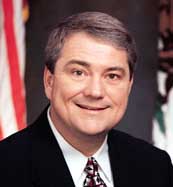-
- Schwarzenegger faced with big judicial appointment
- Prosecution star witness testifies in transgender killing case
- Senate panel passes bill to create civil unions
- Arguments for, against Pryor changed little through process
- Supreme Court rules federal authorities can prosecute medical marijuana users
- Shared custody OK’d in ex-wife’s challenge of transsexual husband
- National News Briefs
- World News Briefs
san diego
California Senate signs resolution opposing ‘Don’t Ask, Don’t Tell’
Resolution calling on Congress and president to end anti-gay policy now goes for full state Senate vote
Published Thursday, 16-Jun-2005 in issue 912
Senate Joint Resolution (SJR) 11, authored by state Senator Christine Kehoe, D-San Diego, passed the state Senate Judiciary Committee last week with a 4-1 vote. SJR 11 calls on Congress and the president to end the military’s “Don’t Ask, Don’t Tell” policy by enacting House Resolution (HR) 1059, the Military Readiness Enhancement Act, authored by Representative Marty Meehan, D- Massachusetts. The resolution now heads for a vote of the full state Senate.
“How can the military exclude thousands of service members who want nothing more than to serve their country honorably?” Senator Kehoe said. “No one can argue that discharging lesbian and gay service members makes our military better prepared, or our nation more secure.”
“It is time our country recognizes the sacrifice and the bravery of over 65,000 gay and lesbian Americans currently on duty in our armed forces and over one million gay and lesbian veterans living in the U.S. who have selflessly given themselves to their country,” said Geoffrey Kors, executive director of Equality California, the lobbying organization that sponsored SJR 11. “Since becoming law in 1994, the military’s ‘Don’t Ask, Don’t Tell’ policy has unfairly prevented gay and lesbian Americans from openly serving their country. The time is now for our service members to be valued by the skills they demonstrate and not be discriminated by who they love.”
According to the February 2005 Government Accountability Office report, the partial cost of this blight on national defense is approximately $190 million. This figure only accounts for recruiting and re-training replacements for over 10,000 capable and devoted service members who were discharged under “Don’t Ask, Don’t Tell.” This includes nearly 800 service members who served in critical occupations, including counterintelligence operations. More than 200 language specialists, with essential skills in Arabic, Farsi and Korean, were relieved of duty because they cannot serve openly in the military.
“Do Americans really care whether the pilot who evacuates an injured GI or the surgeon who sews up his or her wounds is lesbian or gay?” said retired Brigadier General Keith H. Kerr. “I hope not.”
Currently, lesbian and gay personnel can serve in the Department of Homeland Security, the Central Intelligence Agency, the Federal Bureau of Investigation, the National Security Agency, and the Defense Intelligence Agency. Internationally, Britain, Israel, and Australia allow service members to serve openly, recognizing that citizens dedicated to serve their country should not be denied this right because of their sexual orientation.
“With gays and lesbians continuing to serve with distinction, the military justifications for the ban no longer hold water,” said Jim Maloney, director of the Military Education Initiative. “Clearly, those serving on the front lines and in the trenches do not believe gays disrupt unit cohesion or troop morale.”
According to a study conducted by the Center of Sexual Minorities in the Military, evidence suggests that the “Don’t Ask, Don’t Tell” policy increases gay troops’ stress levels, lowers their morale, impairs their ability to form bonds with peers, and restricts their access to medical care.
“Our responsibility [is] to ensure that the best and the brightest serve in our armed forces,” said Bridget Wilson, a San Diego attorney who specializes in military law. “Our gay citizens in uniform should not be forced to compromise their honor by living a lie. They should not be deprived of the very rights they defend, even with their lives.”
Last year, Equality California successfully sponsored Assembly Bill 2900, authored by Assemblymember John Laird, D-Santa Cruz, which allowed members of the California State Militia to serve as openly lesbian and gay service members. California is home to 26 military bases which house tens of thousands of military personnel and their families. According a 2004 Urban Institute Study, approximately 137,000 gay and lesbian veterans currently live in California.
The Senate Judiciary Committee vote was:
4 ayes: Cedillo, Dunn, Figueroa, Kuehl
1 noe: Morrow
2 absent, abstaining or not voting: Ackerman, Escutia
-Press release
|
|
Copyright © 2003-2025 Uptown Publications


